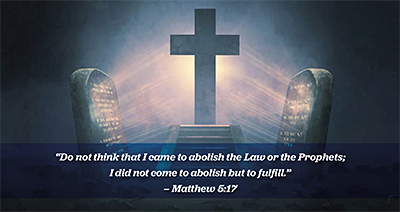All Things New
New and Improved
By Tim Moore

Have you looked at yourself up close in a mirror recently? I mean really, really close—as in a magnifying mirror. Unless you are very young, you’ll find that a magnified close-up is rarely flattering. Every wrinkle and blemish and errant hair (or lack thereof) is exaggerated to our great chagrin.
Whether we see ourselves up close or not, those same blemishes are there on full display every day. These days, more men are hiding behind prodigious beards and long hair. Ladies are able to conceal certain perceived flaws with makeup. But from a very young age, we are all winding down.
The author of Ecclesiastes recognized the apparent futility of this life: “Vanity of vanities! All is vanity” (Ecclesiastes 1:2). Those words of wisdom are attributed to the Preacher, David’s son, king in Jerusalem. Most scholars believe that Solomon penned Ecclesiastes.
If the wisest man who ever lived, who was blessed with riches and a kingdom that expanded Israel’s borders and wealth, lamented such pointlessness, what aspiration for meaning can we have in this life?
The Danger of Overthinking
Pessimism can stem from perceiving too vividly or feeling too deeply. Perhaps the Apostle Thomas doubted so frequently because he had been jilted and disappointed by life too often. Jesus did not harshly condemn his skepticism, but gently encouraged him to embrace evidence of a greater reality.
History offers numerous examples of great men and women who struggle with depression. Abraham Lincoln, William Tecumseh Sherman, Ernest Hemingway, and Winston Churchill all suffered from what used to be called deep bouts of melancholy.
Sometimes, extensive book knowledge can isolate us from the reality of the world around us. Festus’ response to Paul’s testimony about Jesus Christ was to call out in a loud voice, “Paul, you are out of your mind! Your great learning is driving you mad” (Acts 26:24). Paul did not deny the idea that great learning could undermine a firm grasp of reality. Instead he replied, “I am not out of my mind, most excellent Festus, but I utter words of sober truth.” Paul testified to what he had personally experienced and what he knew King Agrippa would understand based on his own knowledge of current events and the prophets.
Nothing More Than Feelings
It is also possible for feelings to become so intense that they weigh in upon us continually. Post-Traumatic Stress Disorder (PTSD) is a clinical term for the condition that a terrifying or shocking experience can cause. Memories of a traumatic experience and the feelings it caused can trigger flashbacks, nightmares, and severe anxiety. People who suffer from PTSD sometimes have a hard time connecting emotionally out of subconscious fear that they may be hurt again. Other sensitive souls look around at the unending stretches of human suffering and lose hope.
We live in an era where the manifestations of discouragement and despair are evident all around us. Prolonged homelessness, drug addiction, and suicide have reached epidemic levels. Even young people, typically brimming with hope and eager to find their place in the world, are falling victim to unchecked nihilism. Many are embracing anti-social behavior, espousing anarchist propaganda, and resorting to suicide.
Covid protocols did not help matters. Last year two cadets at the Air Force Academy committed suicide toward the end of the academic year, in part because of heavy-handed Covid lock-downs. But even before Covid, teen suicide rates had increased 60% in the preceding 10 years.
Regarding the caution of pitching over into the oblivion of our own minds and our own feelings, Benjamin Franklin offered us this wisdom in his Poor Richard’s Almanac of 1750: “There are three Things extremely hard, Steel, a Diamond, and to know one’s self.” The Lord who made us, said it even better, “The heart is more deceitful than all else and is desperately sick; who can understand it?” (Jeremiah 17:9).
The Value of God’s Word
I’ve seen many people become so enamored with their own learning that they cast themselves adrift from the Christian faith upon which they were raised. Like a ship that casts off from the safety of a harbor into a raging storm, they are soon tossed about by the tempest that is our modern culture.
God’s Word speaks about the origin of Creation, the nature of man, the important difference between men and women, and the ordained relationship of marriage. Perhaps because God was so clear about those ontological distinctions, Satan has hurled his most pointed attacks on these fronts.
Ontological = the area of philosophy and science dealing with the nature of being.
Even within the Church, respect for the full counsel of God’s Word is not universal. Some faithful Christians find themselves drawn toward two extremes relative to the Old Testament. Some discount the entire Old Testament, while others attempt to revert to its Law and ordinances.
Within the first group, we’ve all heard Christians who are quick to proclaim that they are “New Testament Christians” — as if the Bible should be cut in two and the outdated first half relegated to a museum of ancient artifacts. Someone recently complained to me that they didn’t need to hear anything from the Old Testament, since it was irrelevant to their Christian faith.
Even renowned preachers of the Word are not immune from a callousness toward the Old Testament. In 2018, Andy Stanley infamously said, “Hey, it’s time that we face the facts and unhitch our faith and our practice from some of these Old Testament values that we can appreciate in their original context, but we really don’t have any business dragging them into a modern context.” He later complained that his statement was taken out of context.

The heresy he flirts with is called Marcionism, after Marcion of Sinope who embraced Christ but denounced the “malevolent” deity of the Old Testament. He claimed that the New Testament is inspired but dismissed the Old Testament as irrelevant to Christian faith. Thankfully, the early Church fathers condemned such a view as heretical.
While most professing Christians would not be so bold as to tear the Old Testament from their Bibles, many have described themselves as a “New Testament Christian”—as if that excuses them from having to grapple with the God of Abraham, Isaac, and Jacob. They tend to dismiss the promises made to the Jews and only want to focus on the love and grace offered by Jesus.
Other Christians go to the opposite extreme. They have rediscovered the Jewish roots of the Christian faith and insist that true faith is demonstrated by a fervent adherence to the Old Testament Law. Movements such as the Hebrew Roots Movement try to impose the yoke of Law on themselves and others. Yet Paul rejoiced to be set free from the Law. He and the other apostles were consistent in recognizing that freedom in Christ relieved Jew and Gentile alike from the burden of the Old Testament.
The Bible Jesus Used
Anyone who has been watching our “Jesus in the Old Testament” TV series on Christ in Prophecy knows that we hold the Old Testament in very high regard. All its prophets and promises pointed to Jesus Christ — both toward His First Advent and to His glorious Second Coming. In Peter’s first sermon to the gathered throngs in Jerusalem on the day of Pentecost, he pointed to fulfilled prophecy (Old Testament prophecy) to validate Jesus as the Messiah of Israel (Acts 2). The truth of his words pierced many of them to the heart, and about 3,000 of them believed and were baptized.
Jesus too, pointed to the prophetic Word. When He was led by the Holy Spirit into the wilderness to be tempted (let the weight of that truth press in upon you!), He responded to the devil’s temptations by quoting the Old Testament. The circumstances and His responses were:
- Hunger — “Man shall not live on bread alone, but on every word that proceeds out of the mouth of God” (Deuteronomy 8:3).
- Recognition of His role as Messiah — “You shall not put the Lord your God to the test” (Deuteronomy 6:16).
- Worship of the world — “You shall worship the Lord your God, and serve Him only” (Deuteronomy 6:13).
Jesus’ prowess with the Word of God makes me realize that I have not studied Deuteronomy enough!
Likewise, when He launched His public ministry in Galilee, Jesus stood in the synagogue at Nazareth and read from Isaiah:
The Spirit of the Lord is upon Me, because He anointed Me to preach the gospel to the poor. He has sent Me to proclaim release to the captives, and recovery of sight to the blind, to set free those who are oppressed, to proclaim the favorable year of the Lord (Luke 4:18-19).
Over and over again, the Gospel writers document that Jesus referenced and cited Old Testament Scripture. Said another way, the Old Testament as we know it was the Bible Jesus used. Similarly, it is impossible to understand many of the prophecies referenced in the New Testament without a solid foundation of Old Testament understanding.
The point of all this is to encourage study of all God’s Word. Hopefully, our “Jesus in the Old Testament” series has demonstrated that even books like Leviticus come alive with relevance and meaning when you read them looking for Jesus Christ. As He testified, “Do not think that I came to abolish the Law or the Prophets; I did not come to abolish but to fulfill. For truly I say to you, until heaven and earth pass away, not the smallest letter or stroke shall pass from the Law until all is accomplished” (Matthew 5:17-18).

New and Improved
The point is not to merely convince you that the Old Testament is rightly joined to the New. The very word “testament” demonstrates that they are testimonies of someone. The same Creator God who tells us in His Word how and why He created the heavens and the earth (to the depth He deemed appropriate) has also told us how He intends to bring human history to its final culmination.
Testament = a tangible proof or expression of a fact, event, or quality; a statement of disposition of property. (i.e. — will) Covenant between God and man.
That progression of revelation and action is eternally relevant. In the beginning God created. He made the heavens and the earth and every living creature ex nihilo (out of nothing). He formed man from the dust of the earth (worthless, cast aside matter) and endued him with worth far above every other creature because he was made “in the image of God” (Genesis 1:27).
What we consider the appearance of age is really a consequence of the fall: we grow old and eventually die. The wages of sin are the decay and death we suffer (Romans 6:23). Even when we recognize our helpless estate and aspire to choose wisely, we are trapped in bodies that are breaking down and saddled with a sinful nature (Romans 7:24). But Christ…
In His first recorded miracle, Jesus demonstrated His power over matter, space, and time. He changed water into wine during a wedding feast in Cana (John 2). This same Jesus — who was nailed to a cross and died, buried in a borrowed grave, rose again to life, and ascended into heaven as His disciples gazed on intently — has promised to make us new again! David sought solace when overwhelmed by the horror of his own sin. He fasted and prayed for seven days following Nathan’s rebuke. Psalm 51 captures his contrition. Just consider the broken heart that cried out, “Create in me a clean heart, O God, and renew a steadfast spirit within me. Do not cast me away from Your presence and do not take Your Holy Spirit from me” (Psalm 51:10-11).
The shepherd king had witnessed Saul descend into mental anguish and confusion when the Spirit of the Lord departed from him. He was desperate to stay close to the Almighty — and understood that his own sin had threatened that relationship. His worthy sacrifice was a broken spirit and a contrite heart.
Thankfully, while we too are called to confess our sins and repent, we have an even better sacrifice. Jesus Christ laid Himself on the altar and His blood covers all “Do not think that I came to abolish the Law or the Prophets; I did not come to abolish but to fulfill.” — Matthew 5:17 our sins. That is why the writer of Hebrews describes the Gospel as a new covenant. When we put our trust in Christ, we receive the new heart and new spirit that God promised Israel in Ezekiel 36:25-27. And that is only a down payment on what is to come.
But Wait, There’s More!
In Revelation 21, John saw a new heaven and a new earth. Speaking of the coming future in the past tense, he observed that the first heaven and the first earth had passed away and there was no longer any sea. He watched as New Jerusalem came down out of heaven. The voice of God validated the name of the city foretold by Ezekiel (“Yahweh Shammah” — The Lord is there, Ezekiel 48:35). He said, “Behold, the tabernacle of God is among men, and He will dwell among them, and they shall be His people, and God Himself will be among them” (Revelation 21:3).
The Lord promised there will no longer be “any mourning, or crying, or pain, the first things have passed away” (v. 4). Then He declared, “Behold, I am making all things new. Write, for these things are faithful and true” (v. 5).
We know that we are promised glorified bodies, which will be like Jesus’ body following His resurrection. They will not wear out or grow old. They will be unfettered by time or space and yet will be able to enjoy food and touch.
Human factors engineers speak of a phenomenon called sensory overload. That occurs when your five senses take in more information than your brain can process, causing your mind or body to either shut down or to flee from the overwhelming stimulation. Our natural senses can be so heightened that we are unaware of what is happening in the spiritual realm. That is exactly what happened with Elisha’s servant (2 Kings 6). Elijah too, came to realize that God often speaks in a whisper instead of a cacophony of noise (1 Kings 19:11-13).
While you await your glorified body, make a point to shut out the clamor in order to hear the voice of the Lord. He has already given you a heart that is attuned to His. As His sheep, you will hear the Great Shepherd speaking to your heart. Praise Him for making you a new creature in Christ — and for the glorified body that awaits you when you meet Him face to face.




